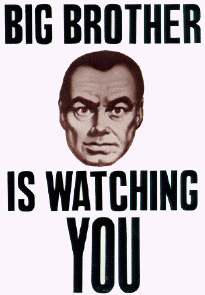Lords: rise of CCTV is threat to freedom
World's most pervasive surveillance undermines basic liberties, say peers
Alan Travis, home affairs editor The Guardian, Friday 6 February 2009
The steady expansion of the "surveillance society" risks undermining fundamental freedoms including the right to privacy, according to a House of Lords report published today.
The peers say Britain has constructed one of the most extensive and technologically advanced surveillance systems in the world in the name of combating terrorism and crime and improving administrative efficiency.
Alan Travis on a Lords report warning that CCTV is a threat to freedom Link to this audio
The report, Surveillance: Citizens and the State, by the Lords' constitution committee, says Britain leads the world in the use of CCTV, with an estimated 4m cameras, and in building a national DNA database, with more than 7% of the population already logged compared with 0.5% in the America.
The cross-party committee which includes Lord Woolf, a former lord chief justice, and two former attorneys general, Lord Morris and Lord Lyell, warns that "pervasive and routine" electronic surveillance and the collection and processing of personal information is almost taken for granted.
Although many surveillance practices and data collection processes are unknown to most people, the expansion in their use represents "one of the most significant changes in the life of the nation since the end of the second world war", the report says. The committee warns that the national DNA database could be used for "malign purposes", challenges whether CCTV cuts crime and questions whether local authorities should be allowed to use surveillance powers at all.
The peers say privacy is an "essential prerequisite to the exercise of individual freedom" and the growing use of surveillance and data collection needs to be regulated by executive and legislative restraint at all times.
Lord Goodlad, the former Tory chief whip and committee chairman, said there could be no justification for this gradual but incessant creep towards every detail about an individual being recorded and pored over by the state.
"The huge rise in surveillance and data collection by the state and other organisations risks undermining the long-standing traditions of privacy and individual freedom which are vital for democracy," he said. "If the public are to trust that information about them is not being improperly used there should be much more openness about what data is collected, by whom and how it is used."
The constitution committee makes more than 40 recommendations to protect individual privacy, including the deletion of all profiles from the national DNA database except for those of convicted criminals and a call for the mandatory encryption of personal data held by public and private organisations that are legally obliged to hold it.
But the report is silent on proposals from Jacqui Smith, the home secretary, for a "superdatabase" tracking everybody's emails, calls, texts and internet use and from Jack Straw, the justice secretary, to lower barriers on the widespread sharing of personal data across the public sector.
But the peers are critical of whether local authorities should continue to exercise their surveillance powers under the Regulation of Investigatory Powers Act 2000. They say examples of local councils using covert surveillance operations to stop fly tipping, reducing dog fouling, and investigate fraudulent school place applications led them to question how they acquired such powers. Ministers should examine whether local authorities, rather than the police, are the appropriate bodies to mount surveillance operations, the peers say. If they are, then their use should be confined to crime investigations that carry a minimum two-year prison sentence.
The peers say individuals targeted by such operations should be informed when it is completed, as long as no investigation is prejudiced.


